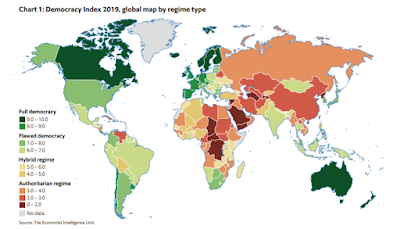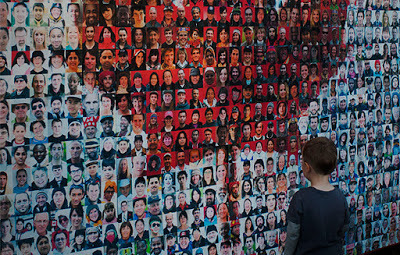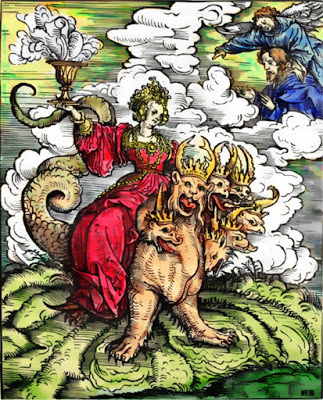Stephen Roney's Blog, page 210
December 24, 2020
The League of Democracies

I have long advocated the formation of a League of Democracies, to do what the United Nations is not capable of doing. So who would be a member? I had a look at the latest Economist Intelligence Unit ranking of democracies.
Interestingly, the United States would not qualify. It is listed as a “flawed democracy.”
The criteria The Economist uses are relatively opaque, but The Economist is no partisan rag; I broadly share its liberal bias; and those who have witnessed the recent US election are likely to agree. Yet this ranking was assigned before that election. The Economist faults the US primarily on government dysfunction and growing partisanship. The current tumult over passing a COVID relief bill is an indication. The bill passes at the last possible moment to prevent a government shutdown, and nobody gets to read it before they must vote on it.
Knowing how flawed Canada’s democracy is, by a lack of proper Parliamentary debate, a lack of free speech, and a lack of diversity in the media, I am hesitant to extend membership in a League of Democracies to any nation that cannot meet at least this meagre standard; yet Canada is solidly in the top rank. So I’d indeed exclude the US for now. Let them hold a couple of elections under League supervision first. Perhaps (being cheeky) they would do better to shift to a Westminster parliamentary system, in which more diverse opinions could be represented, and legislature and executive are never long at loggerheads.
Member states by this metric, then, are the CANZUK nations, Canada, Australia, New Zealand, the United Kingdom; the Nordic countries, Sweden, Finland, Norway, Denmark, Iceland; Ireland, Germany, France, Spain, Portugal, the Netherlands, Austria, Switzerland, Luxembourg, Chile, Uruguay, Costa Rica, Mauritius.
It is noticeable than most on the list do have a parliamentary system, rather than the American presidential system. And a surprising number of them are monarchies. Is this a British bias, the EIU being headquartered in London? If so, I suppose I share it.
'Od's Blog: Catholic comments on the passing parade.
Life under the Family Compact

y friend the literary immigrant laments that the Canadian literary scene is cliquish. This is a longstanding problem. It is a continuing Canadian problem; it is a burden of our colonial history. one can trace it back to the days of the Family Compact and the Chateau Clique. My literary friend is not equipped to understand, because she comes from Iran. Unlike Iran, at least in recent centuries, Canada has a history and a self-identity as a colony. This causes Canadians to undervalue anything domestic, and overvalue anything foreign: power and significance always comes from away. Ideally not from the United States, because we also define ourselves in contrast to the United States. One result is that anything “diverse,” that is, from abroad, is celebrated and admired. Including foreign governments, as bad as they might be.
Another consequence is that the popular, the people, are undervalued. They are, after all, stupid colonials, far from the sources of metropolitan wisdom. Cliques form on the implicit premise that to be of any cultural value, to be worthy of power, one must be apart from the general herd. In Canada, this has usually been based on having been born abroad, or educated abroad, or making it abroad.
This is the foundation of “multiculturalism.” Recent immigrants like my friend blunder into this, and benefit from it, without generally finding any sense in it. They know things suck where they came from. They know things are oddly cliquish in Canada. But why bring that up, when, as a "minority," you are being treated like royalty?
This is a world in which it is hard to be honest.
'Od's Blog: Catholic comments on the passing parade.
December 23, 2020
Have to Get This in Before Christmas
'Od's Blog: Catholic comments on the passing parade.
Maintiens le Droit

A literary friend, an immigrant to Canada, laments that
“The biggest damage done by racism is that it has shut down critical enquiry and self-critique among minorities. In an attempt to salvage our identity, we paint a blameless picture of our identity, race, ethnicity, religion, culture, and community. ... Racism makes us afraid of self-critique for fear that it may be used against us.”
This take is wrong. Groups that are discriminated against do not close ranks and refuse to criticize one another. Just the reverse: individuals try to “pass,” often by condemning their own group. You get “Uncle Toms”; anti-Semitic Jews; or, as George Bernard Shaw once said, “the Irish are the most honest of all races; they never have anything good to say about each other.”
The fact that we see the exact opposite in Canada’s communities of recent immigrants informs us that the problem is not discrimination against “minorities.” As should be obvious: in contemporary Canada, minority status is celebrated by government. “Multiculturalism” and “diversity” is official government policy. The better comparison is with “professional courtesy”: a doctor is never supposed to criticize another doctor, a lawyer another lawyer, because it might threaten their shared prestige.
Indeed, given Canada’s “hate laws,” anyone criticizing multiculturalism, diversity, or any particular immigrant or foreign culture faces a possible prison term. It is therefore safer for any of us to say nothing against, for example, the rather less than admirable government of Iran, or China, for all that they may oppress their own people, or be opposed to individual rights and human equality. Someone might take offense, and our lives be ruined. It is perfectly fine, safe, and socially acceptable, on the other hand, as my friend notices, to criticize the government or the culture of Canada. Or other nations, like the US or the UK or France, that are friendly to Canada and share its values.
Sadly, my immigrant friend has not yet strayed off the plantation. She naïvely supposes that the left supports free speech. She is puzzled, therefore, that she cannot get literary magazines to publish anything she writes that is critical of the government of her home country.
But it is “the left” that has passed and aggressively supports restrictions on free speech such as those “hate laws.” It is the left that has advanced “deplatforming” opposing views, that has shown up to riot when the wrong speakers are invited to campus, that has engaged in widespread blacklisting, “political correctness,” legally required speech--forcing people to use designated gender pronouns--and so forth. Liberalism, the political philosophy that believes in human rights like freedom of speech, has been gradually forced to the right in North America. Perhaps it started with the rejection by the left of the right to life.
“The left” as such has no particular problem with dictatorships, and broadly supports intrusive government.
Liberalism is also the philosophy that believes in human equality. It is not helpful to divide people up into “minorities,” as the left always does. Properly speaking, all Canadians are members of ethnic minorities within Canada, and all humans are members of ethnic minorities in global terms. And how we are divided into special interest groups is perfectly arbitrary: why, say, skin colour, and not height? Is a second-generation Chinese immigrant really more culturally like the Chinese of Beijing than like the kid on the next block?
Instead of accentuating our divisions, we ought to be working together to create one unified Canadian culture, and one world culture, open to all of us. That is the special opportunity that Canada, as a post-ethnic nation, offers us.
'Od's Blog: Catholic comments on the passing parade.
A K-Pop Christmas
'Od's Blog: Catholic comments on the passing parade.
A Brooklyn Christmas
A Leonard Cohen Christmas
December 22, 2020
For the Winter Solstice
The Whore of Babylon

My Jehovah’s Witness friend Hadassah is convinced the scarlet woman in the Book of Revelations, aka the Whore of Babylon, represents all religions except her own.
I respond: the great harlot has to be identified firstly with the city of Babylon, because the Bible says that expressly. She is named. “On her forehead a name was written, ‘MYSTERY, BABYLON THE GREAT, THE MOTHER OF THE PROSTITUTES AND OF THE ABOMINATIONS OF THE EARTH.’" “The kings of the earth, who committed sexual immorality and lived wantonly with her, will weep and wail over her, when they look at the smoke of her burning, standing far away for the fear of her torment, saying, 'Woe, woe, the great city, Babylon, the strong city!’” Revelations 17: 18: “The woman whom you saw is the great city, which reigns over the kings of the earth."
But the passage was written in the time of the Roman Empire, and the woman sits on seven mountains—the seven hills of Rome.
She therefore represents temporal power in general—the urge for power, the urge to dominate. She declares herself “Queen,” and all kings fornicate with her: she is the consort of all kings, the thing they lust after—power.
She is adorned with gold and precious jewels—the urge for material wealth. When she falls, she is mourned by merchants and traders; she also represents then what they most desire or lust after—wealth, worldly goods, material possessions.
As a prostitute, she also represents the sexual urge.
The beast on which she rides “was, and is not, and shall be present.” This is not a vision of the future, then, but of something present in both past and future. The mystery is why John says the beast “is not,” although he is writing during the Roman Empire, and the beast appears before him.
I suspect his meaning is that the beast is only temporarily obscured by the prostitute, her diadems, her beauty, the city. That beneath all these seemingly desirable and sophisticated and “civilized” things, is the beast, man’s bestial nature. If one pursues these things, the beast will emerge. For they are founded on the beast; they ride it.
Hadassah associates the scarlet woman instead with religion on the strength of one passage, Revelation 18:23, which she reads as “by her spiritistic practice all the nations were misled.” “Spiritistic practice”? Does that sound a little contrived? The NIV gives that as “magic spell.” Most other English translations have “sorcery.” But the actual word in the original Greek is “pharmakeia.” You may note the similarity with the English “pharmacy,” the preparation and administration of drugs, medicines. And notice that she is holding a poisoned cup: “a golden cup full of abominations and the impurities of her fornication.”
The simplest interpretation is that physical lusts are like a drug, like wine or some stronger hallucinogen, clouding our perception of reality, poisoning us spiritually. All major religions are opposed to sorcery and casting spells; certainly including orthodox Christianity. None are keen on drunkenness. Instead, it is actually what we now call science that emerges directly from the magical or spellcasting tradition, and from the Babylonian tradition of astrology, mages, and “magic.” “Scientist” literally means the same thing as “mage.” The earliest “scientists” or “empiricists” of Europe were physicians who claimed to be able to heal illnesses with potions. Chemistry, in turn, emerged from alchemy. And one of its first successful products was the distillation of alcohol.
This raises the interesting possibility that the scarlet woman can be interpreted to represent, inter alia, modern scientism: the pseudo-religious creed that science can explain all things and accomplish all things. Which is pretty much shared these days by all nations.
'Od's Blog: Catholic comments on the passing parade.




